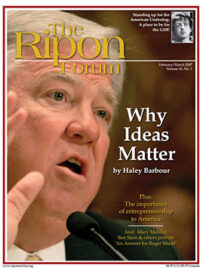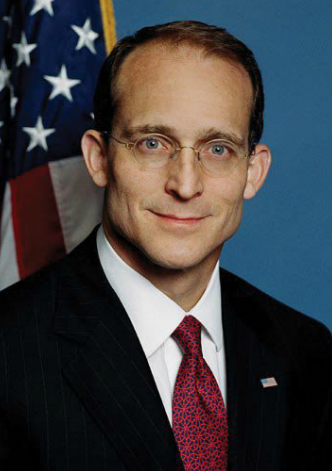Starting a business is not easy. Entrepreneurs must be willing to take risks others won’t. They must work around the clock if necessary, often acting not only as the CEO of their company, but the head of sales, head of finance, and whatever else it takes to get the job done.
It’s hard work. In fact, I often say small business owners match every dollar of equity with $10 of sweat equity. But that’s also why they’re successful where others are not. America has an economy that regenerates, is flexible, and adapts to opportunity in large part because our entrepreneurial culture has taught us to dream, to see possibilities, and to act on these possibilities.
Why is this important? Since August 2003, more than 7.2 million jobs have been created—more jobs than the European Union and Japan combined. Our economy has now added jobs for 41 straight months. And American workers are taking home more pay with those jobs. Real after-tax income per person has risen by 9.6 percent – $2,840 – since the President took office.
Such growth occurs in large measure because of the perseverance and productivity of our Nation’s entrepreneurs.
Nurturing the Innovators
Small businesses drive our economy. They create 70% of the new jobs and represent more than half of our non-farm private GDP.
They drive a tremendous amount of the innovation in our country; small patenting firms produce 13 to 14 times more patents per employee than their larger competitors do. Small business ownership allows people to realize dreams, not only for the owners and their families, but for those they employ and those they serve.
Small businesses drive our economy. They create 70% of the new jobs and represent more than half of our non-farm private GDP.
One of the goals of the Small Business Administration is to be a partner to entrepreneurs. Over the years, the agency has helped many of our best known corporate icons get their starts. Intel, America Online, Outback Steakhouse, Apple Computer, Amgen, Ben & Jerry’s, Callaway Golf, Staples, Under Armour, Nike, and Federal Express all received help from one of SBA’s programs.
Today, we help entrepreneurs in numerous ways:
- The SBA lends or guarantees more than $78 billion in loans and investments;
- It helps small business procure a fair share of government contracts, a record $80 billion in 2005;
- Last year, SBA and its technical assistance partners counseled nearly 1.5 million entrepreneurs and its website received 26 million hits;
- Through its Office of Advocacy, SBA helps protect small business from harmful new government regulations, and through its National Ombudsman it helps small business deal with unfair application of existing regulation;
- Over the last six years, SBA lending to minority entrepreneurs has increased over 150 percent. The number of entrepreneurs receiving SBA counseling is up 40 percent.
We are a small agency with a very big reach. We are also an agency with a very big job. Over the past 18 months, one of the biggest parts of our job has been to help people along our Nation’s Gulf Coast recover from the 2005 hurricanes. The agency provides low interest, long-term disaster loans to homeowners and small businesses.
In the wake of this disaster, the SBA was simply overwhelmed trying to respond to the demand for construction loans. To accelerate the distribution of funds, it was clear we needed to eliminate bottlenecks in certain areas, reduce errors and rework, and provide a more responsive and compassionate face to the disaster victims.
Since last summer, we have fully redesigned our workflow from a production line with inadequate coordination and communication between functions to 15 person functionally-integrated teams with much greater authority to make decisions and manage accountability for results. We moved 1,300 staff to support this new process. Each borrower has a relationship manager who understands their issues and can advise and assist them through the process. We began by contacting over 90,000 borrowers in the Gulf Coast region to reestablish those relationships. We have also instituted much tighter tracking and management of outcomes.
In our most problematic process, we have virtually eliminated our backlogs and improved our response time by almost 90 percent. We are now working to help people with issues once considered outside our purview. The SBA has also been busy on the ground helping small business owners get their lives back through counseling and lending support and helping entrepreneurs access much needed revenue from the government rebuilding efforts taking place.
Of 160,000 applicants with approved loans from the 2005 hurricanes, 98% have now either received all or some of their loan money, or have chosen not to proceed with their loans, generally because they secured funds elsewhere. And of the $7 billion in approved loans requested by borrowers, we have now put $5 billion in SBA disaster assistance funds to work rebuilding businesses and homes along the Gulf Coast. Approximately $2 billion in additional commitments are available to be disbursed when the borrowers request them.
An Environment to Succeed
Whether it is someone trying to rebuild a business or start a new one, the Small Business Administration remains committed to helping entrepreneurs in the United States succeed.
We want entrepreneurs to think big because they are the engine driving better jobs for Americans, greater competitiveness in the global marketplace, and transformation for our communities.
As we continue our efforts in this regard, it is critical that we have thoughtful, fiscally responsible policies to unleash the power of entrepreneurial capitalism in under served markets in this country.
SBA works to drive successful, sustainable, business formation into under served markets. I believe this is the heart of the President’s notion of compassionate conservatism.
We have a new Congress and should expect from it a continuation of the sound economic policies that have fostered an environment where innovation succeeds and small businesses flourish, fuel our economy, and create more jobs. We do this by:
- Making it easier for small businesses and their employees to obtain affordable, high quality health insurance;
- Keeping taxes low and reforming an unnecessarily complex tax code; and,
- Cutting burdensome government regulation and red tape.
With the President, I believe ownership anchors us in what is important. SBA not only works with start-up businesses, but with small businesses hoping to expand to the next level. Through training, contracting, and loans we can help entrepreneurs expand locally or even into new communities, or to start new businesses, creating more jobs.
Foreign markets are more open to U.S. small business exporters than ever before thanks to fewer trade barriers, improved communication and the ability to ship goods more cheaply.
We want entrepreneurs to think big because they are the engine driving better jobs for Americans, greater competitiveness in the global marketplace, and transformation for our communities.
The men and women of the SBA have the honor and the responsibility of helping that engine reach its potential.
In doing so, the legacy we leave will be in the stories of every American we empower – today, and for many years to come. RF
Steven Preston is the Administrator of the U.S. Small Business Administration.





